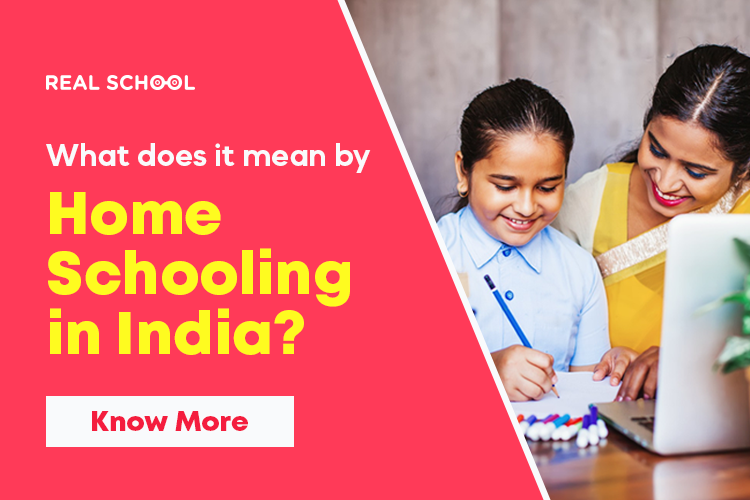What Does it Mean by Homeschooling in India? Let’s Check Out Home Education in India!


If you are willing to get knowledge about homeschooling in India or the advantages of home education, you will grab the details from this article. What is homeschooling? What does it mean by homeschooling in India? Let’s find out!
Also Read: Online Schooling: Educating Children with Special Needs
What does it Mean by Homeschooling in India?
In India, homeschooling refers to the practice of parents or legal guardians educating their children at home rather than sending them to a traditional school. Homeschooling is a relatively new concept in India and is not as widely practiced as it is in some other countries.
Parents who choose to homeschool their children in India are responsible for designing and implementing their own curriculum, selecting appropriate learning materials and resources, and assessing their children’s progress. Homeschooling in India is legal, but it is not yet regulated by the government, which means that parents are not required to register with any educational authority or follow any specific guidelines or regulations.


Parents who choose to homeschool their children in India may do so for a variety of reasons, including religious or cultural beliefs, dissatisfaction with the traditional education system, or a desire to provide a more personalized and flexible education for their children. However, homeschooling in India can be challenging, as it requires a significant commitment of time, resources, and effort from parents, and may limit children’s socialization opportunities.
Homeschooling in India
Homeschooling in India, like any other country, can have both advantages and disadvantages. Here are some potential benefits of homeschooling in India:
# Personalized education: Homeschooling allows for a personalized education that can be tailored to a child’s individual needs and learning style, which can lead to better academic outcomes.
#:Flexibility: Homeschooling provides greater flexibility in terms of scheduling and pacing, which can allow children to explore their interests and passions and pursue non-academic activities like sports, music, or art.
# Safe learning environment: Parents can create a safe and nurturing learning environment for their children, free from negative influences like bullying or peer pressure.
# Family bonding: Homeschooling can strengthen family bonds by allowing parents to spend more time with their children and involve them in family activities and interests.
# Control over curriculum: Homeschooling gives parents full control over the curriculum, allowing them to incorporate their values, beliefs, and culture into their children’s education.
# Individualized attention: Homeschooling provides children with individualized attention from their parents or tutors, which can help them progress at their own pace and receive one-on-one support.
# Reduced costs: Homeschooling can be a more cost-effective alternative to traditional schools, as parents can avoid the expenses associated with uniforms, transportation, and tuition fees.
It’s important to note that homeschooling is not for everyone and requires a significant commitment of time, effort, and resources from parents. Before deciding to homeschool, parents should carefully consider their child’s needs, their own abilities and resources, and the potential challenges and benefits of homeschooling.
Also Read: What are the Benefits of Montessori Education? Let’s Acknowledge the Montessori Activities List!
Homeschooling Disadvantages
Like any educational option, homeschooling in India also has some potential disadvantages. Here are some potential drawbacks to consider:
# Socialization: Homeschooling can limit children’s opportunities for socialization, which is an important aspect of a child’s development. Children may miss out on the social interaction and group activities that are available in a traditional school setting.
# Limited resources: Homeschooling in India can be challenging due to limited resources and materials, especially for parents who live in remote or rural areas.
# Parental responsibility: Homeschooling places a significant burden of responsibility on parents, who are responsible for designing and implementing the curriculum, assessing their child’s progress, and providing all necessary resources and materials.
# Lack of standardization: Homeschooling is not regulated in India, which means that there are no uniform standards or guidelines for homeschooling families to follow. This lack of standardization can make it difficult for parents to ensure that their children receive a quality education.
# Limited career opportunities: Homeschooled children may face limited career opportunities in India, as some employers may be unfamiliar with homeschooling and may prefer candidates who have attended a traditional school.
# Potential for burnout: Homeschooling can be emotionally and physically demanding, which can lead to burnout for parents who are responsible for both their children’s education and their own personal and professional obligations.
It’s important for parents considering homeschooling in India to carefully weigh the potential advantages and disadvantages and ensure that homeschooling is a good fit for their family’s unique needs and circumstances.
Conclusion
Hopefully, you have liked this article and the information given in this article is helpful for you. If you want to know more, visit the Real School website.
Recent Posts
What are the Advantages of Online Teaching at The Real School?
In the article -"What are the Advantages of Online Teaching at The Real School?" we…
What is the Full Form of School?: Unveiling the Acronym
The term "school" carries profound significance in the realm of education, representing more than just…
What is Math Full Form?: Cracking the Code
Mathematics, often referred to as "Math," is a subject that elicits various reactions from students…
What is Full Form of Homework?: Decoding Academics
Homework, an integral part of the academic journey, often raises questions about its purpose and…
What is Full Form of Teacher?: Demystifying Education
In the intricate tapestry of education, teachers stand as the pillars shaping the intellectual and…
What is Real Education?: Discovering Its Essence and Impact
The concept of real education is evolving, transcending traditional views that equate it solely with…


